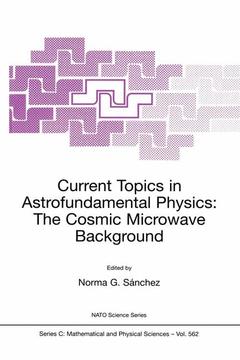Description
Current Topics in Astrofundamental Physics: The Cosmic Microwave Background, 2001
Nato Science Series C: Series, Vol. 562
Coordinator: Sànchez Norma G.
Language: English
Subjects for Current Topics in Astrofundamental Physics: The Cosmic...:
Keywords
Accretion; Cosmology; Dark matter; EFE; Gravity; Redshift; Renormalization group; Universe; astronomy; astrophysics
Current topics in astrofundamental physics: the cosmic microwave background
Publication date: 03-2001
662 p. · 15.5x23.5 cm · Paperback
Publication date: 03-2001
662 p. · 15.5x23.5 cm · Paperback
Current topics in astrofundamental physics : the cosmic microwave background. Proc. NATO advanced study Ins. Erice, Ettore Majorana Centre, 5-16 December 99
Publication date: 03-2001
662 p. · 15.5x23.5 cm · Hardback
Publication date: 03-2001
662 p. · 15.5x23.5 cm · Hardback
Description
/li>Contents
/li>
This NATO Advanced Study Institute provided an up dated understanding, from a fundamental and deep point of view, of the progress and current problems in the early universe, cosmic microwave background radiation, large scale structure, dark matter problem, and the interplay between them. The focus was placed on the Cosmic Microwave Background Radiation. Emphasis was given to the mutual impact of fundamental physics and cosmology, both at theoretical and experimental-or observational-levels, within a deep and well defined programme, and a global unifying view, which, in addition, provides of careful inter-disciplinarity. Special Lectures were devoted to neutrinos in astrophysics and high energy astrophysics. In addition, each Course of this series, introduced and promoted topics or subjects, which, although not being of purely astrophysical or cosmological nature, were of relevant physical interest for astrophysics and cosmology. Deep understanding, clarification, synthesis, careful interdisciplinarity within a fundamental physics framework, werethe maingoals ofthe course. Lectures ranged from a motivation and pedagogical introduction for students and participants not directly working in the field to the latest developmentsand most recent results. All Lectures were plenary, had the same duration and were followed by a discussion. The Course brought together experimentalists and theoretical physicists, astrophysicists and astronomers from a variety of backgrounds, including young scientists at post-doctoral level, senior scientists and advanced graduatestudentsas well.
Preface. 50th Anniversary of the Founding of NATO. Dedication of the 7th Course to Ya.B. Zeldovich. 80th Anniversary of Professor I.M. Khalatnikov. I: The Early Universe. Phase Transitions in the Early Universe; M. Shaposhnikov. Elements of Baryogenesis; W. Buchmüller, S. Fredenhagen. Out of Equilibrium Fields in Selfconsistent Inflationary Dynamics. Density Fluctuations; D. Boyanovsky, H.J. de Vega. Minimal String Driven Cosmology and its Predictions; M.P. Infante, N. Sánchez. New Dual Relations Between Quantum Field Theory and String Regimes in Curved Backgrounds; M. Ramon Medrano, N. Sánchez. Detectability of Relic Squeezed Gravitational Waves by Laser Interferometers; L.P. Grishchuk. Gravitational Field and Its Energy-Momentum Tensor; L.P. Grishchuk, S.V. Babak. II: Cosmic Microwave Background Radiation. Observations and Theory of The Cosmic Microwave Background; A.N. Lasenby. The 1+3 Covariant Approach to CMB Anisotropies. Erice Lectures 1999; G.F.R. Ellis, P.K.S. Dunsby. Some Problems of the CMB Polarization; P. Naselsky, et al. The High Redshift Radio Universe; Yu.N. Parijskij. III: Large Scale Structure, Dark Matter. In Search of the Early Universe. I. The Oldest Stars; P.W. Hodge. In Search of the Early Universe. II. The Youngest Galaxies; P.W. Hodge. Clusters of Galaxies and the Large Scale Structure; G. Chincarini. Structure Formation of Galaxy Clusters and Beyond; L.-Z. Fang. Warm Dark Matter. Clues to Primordial Phase Density from the Structure of Galaxy Halos; C.J. Hogan. Dark Matter as Determined from Energetic Particles; P.L. Biermann. IV: Fractals and Scaling Laws in Astrophysics and Cosmology. Fractal Lacunarity andScenarios for the Near-Isotropic Distribution of Galaxies; B.B. Mandelbrot. Fractal Structures and the Large Scale Distribution of Galaxies; L. Pietronero, F.Sylos Labini. The Cosmological Many-Body Problem and Some of its Observational Implications; W.C. Saslaw. The Statistical Mechanics of the Self-Gravitating Gas: Equation of State and Fractal Dimension; H.J. de Vega, N. Sánchez. Renormalization Group Flow and Fragmentation in the Self-Gravitating Thermal Gas; B. Semelin, et al. V: High Energy and Neutrino Astrophysics. Bepposax: 3 Years of Operation. Highlights and Significant Results; L. Scarsi. The Extreme Energy Cosmic Rays and Cosmic Neutrinos as Probes for the Distant Universe. Astrophysics Involved and Experimental Approach; L. Scarsi. Origin and Physics of the Highest Energy Particles in the Universe; P.L. Biermann, et al. The Gamma-Ray Bursts and the SWIFT Mission; G. Chincarini, D. Lazzati. Neutrino Oscillations and Cosmology; A.D. Dolgov. High Energy Neutrino Astronomy: Towards Kilometer-Scale Detectors; F. Halzen. Accretion of Gas onto Black Holes; I.V. Artemova, et al. Mass Extinctions of Species &endash; Were Dinosaurs Killed by an Asteroid or Volcanoes? D.R.O. Morrison. Opening the Third Millennium. Photographs of the Institute. Author Index.
© 2024 LAVOISIER S.A.S.




